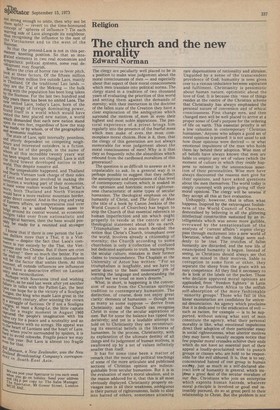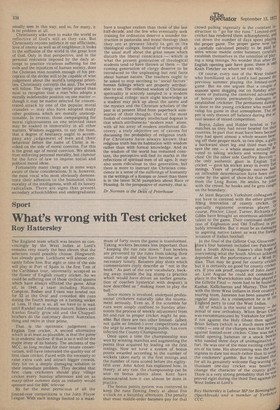Religion
The church and the new morality
Edward Norman
The clergy are peculiarly well placed to be in a position to make wise judgement about the moral consciousness of men — and especially about that aspect of their moral consciousness which men translate into political norms. The clergy stand in a tradition of two thousand years of evaluating the priorities of this world and setting them against the demands of eternity; with their instruction in the doctrine of the fallen state of the Creation they have a clear explanation of the ambiguities which surround the motives of men in even their highest and most noble aspirations. The pastoral experience of a priest brings him regularly into the presence of the fearful mess which men make of even the most commonplace moral choices. How is it, then, that the clergy of this generation are not always memorable for wise judgement about the moral consciousness of men? Why is it that they so frequently echo the absurdities which rebound from the cardboard moralities of this generation? The question is as difficult to answer as it is unpalatable to ask. In a general way it is perhaps possible to suggest that they reflect the assumptions and expectations of that level of contemporary culture which is soaked in the optimism and histrionic moral righteousness characteristic of some types of secular humanism. The theological emphasis on the humanity of Christ, and The Glory of Man (the title of a book by Canon Jenkins of the World Council of Churches) has begun to strip the Church of that essential reference to human imperfection and sin which ought properly to reside at the centre of any theological statement about life on earth. ' Triumphalism' is also much derided: the notion that Christ's Church, triumphant over the world, involves already a citizenship of eternity; the Church according to some churchmen is only a' collection of confused but dedicated aspirants to truth, learning from the secular culture, mistaken in their former claims to transcendance. The Chaplain at the University of Aston has written: For us triumphalism is laughable, and we have to settle down to the basic missionaryjob of learning the language and understanding the culture lest we tread on men's dreams."
What, in short, is happening is the conversion of some from the Christian spiritual tradition to contemporary humanism. The distinction, of course, does not enjoy great clarity: elements of humanism — though not as many as some suppose — derive from Christianity, and the Church can recognise. Christ in some of the secular aspirations of men. But for some the balance has tipped too decisively; and yet in a laudable attempt to hold on to Christianity they are reconstructing its essential beliefs in the likeness of humanism. In the process, Christianity, with its explanation of the ultimate destiny of all things and its judgement of human motives, is swallowed up by a set of values infinitely smaller than itself.
It has for some time been a matter of remark,that the moral and political teachings of some of the more articulate and publicised sections of Christian opinion are indistinguishable from secular humanism. But it is in the evaluation of men's moral idealism, and in the reason adduced for it, that this is all most obviously displayed. Christianity properly envisages men in all their weakness, ambiguous in their pursuit of righteousness, liable to slide into hatred of others, sometimes attaining
rare dispensations of rationality and altruism. Unguided by a sense of the transcendent providence of God, humanity is seen given over to a riotous imbalance between aspiration and fulfilment. Christianity is pessimistic about human nature, optimistic about the love of God. It is because this 'rinse of things resides at the centre of the Christian scheme that Christianity has always emphasised the personal nature of conversion and of ethical consciousness. First change men, and then changed men will be well placed to arrive at a proper sense of God's purpose for the ordering of life on earth. This essential priority is set a low valuation in contemporary Christian humanism.' Anyone who adopts a good set of moral opinions is praised: it is not usual to ask how those opinions were derived — or what emotional impulsions of the man who holds them lay behind their adoption. Wise men of all beliefs have always known that men are liable to employ any set of values (which the moment of culture in which they reside happens to esteem) in the unconscious assertion of their personalities. Wise men have always discounted the reasons men give for their opinions, and have asked questions about the men themselves. The world today is simply crammed with people giving off their moral opinioni.--The clergy will be unwise if they accept all this at face evaluation.
Unhappily, however, that is often what happens. Inspired by the extravagant foolishness of the World Council of Churches, demoralised by believing in all the glittering intellectual construction sustained by an intelligentsia which was never more gullible, overawed by the sensationalism of the analysts of current affairs ': sopme clergy pass through excitement into a new world of liberation, where all these things seem suddenly to be true. The crutches of fallen humanity are discarded, and the new life of emancipated humanity is begun. Instead of seeing, as Christians should always see that men are mixed in their motives, liable to corruption in some form or other, they separate the sheep from the goats with an easy competence. All they find it necessary to do is look at the labels on the packet. Those who declaim approved moral opinions are applauded, from freedom fighters' in Latin America or Southern Africa to the selfish self-absorption of the more fashionable
minority groups.' Those who fail-in this linear examination are candidates for universal denunciation, An agency which proclaims, that it is dedicated to the eradication of evil — such as racism, for example -is to be supported, without asking what sort of men constitute the agency, what their personal morality is like, what emotional impulsions direct their adoption of their particular essay in social righteousness, what ulterior motives they may have, It usually escapes notice that few popular moral crusades achieve their ends which do not have an essential part of their appeal a loudly-proclaimed wish to punich groups or classes who are held to be responsible for the evil abhored. It is, that is to say, concentrated hatred of one group in human soc1e4y, just as much as a self-declared abstract love of humanity in general, which insplus a great deal of the secular moralism of our day. Christians who join an enterprise which exploits human hatreds, whatever moral p-rinciple is involved or good end ostensibly pursued, do so at great peril to their relationship to Christ. But the problem is not
usually seen in this way, and so, for many, it is no problem at all. Christianity asks men to make the world as reflective of God's will as they can. But Christianity enjoins patience in our afflictions, love of enemy as well as of neighbour; it looks to the suffusion of the world in the great love of God. Only in that perspective, and in the personal restraints imposed by the daily attempt to practice vicarious suffering for the evils and the injustices of human society, does the Christian man nourish enough of his perception of the divine will to be capable of wise judgement about the world's temporal priorities. Christianity converts the soul. The world will follow. The clergy are better placed than most to recognise that a man who adopts a morally indefensible position on one matter — though it may be matter selected for concentrated attack by one of the popular moral crusades — may also have adopted many other positions which are morally unexceptionable. In reverse, those campaigning for moral righteousness on one selected issue may be soaked in immorality in all other matters. Wisdom suggests, to say the least, that a degree of hesitancy ought to accompany any judgement of men and their behaviour before the name of Christ is invoked on the side of moral coercion. For this is the great age of moral coercion. We shrink from enforcing personal morality, but clamour for the force of law to impose social and political moral ideas. Fortunately many clergy are in some ways aware of these considerations. It is, however, the most vocal who most obviously demonstrate their adhesion to the humanist class morality of the intelligensia, with all its luxury radicalism. There are signs that present secondary schoolchildren and undergraduates have a tougher realism than those of the last half-decade, and the few who eventually seek training for ordination deserve a sounder instruction in pastoralia and moral theology than they are at present likely to get in the theological colleges Instead of rehearsing all the usual stuff about the great issues which disturb the liberal conscience — which is what the present generation of theological students tend to have thrown at them — the coming generation of clergy deserve to be introduced to the unpleasing but real facts about human nature. The teachers ought to be asked to stop ascribing to ' social factors human failings which are properly attributable to sin. The collected wisdom of Christian spirituality is scarcely sampled in a modern theological college: such slight knowledge as a student may pick up about the saints and the mystics and the Christian scholars of the past is at present lifted from paperback summaries of their thought. One of the most foolish of contemporary intellectual dogmas is that which attributes to 'modern man' alone, with all his array of modern intellectual discovery, a truly objective set of canons for discussing the probability of religious truth. For Christians have always known that religious truth has its habitation with wisdom rather than with formal knowledge. And as the wisdom of the world has remained constant, the perceptive will find its marks in the reflections of spiritual men of all ages. It may also seem ridiculous to this generation, but there is more to instruct the Christian conscience in a sense of the sufferings of humanity in the writings of a Kempis or Jewel than there is in the latest SCM pamphlets about Race or Housing. In the perspective of eternity, that is.
Dr Norman is the Dean of Peterhouse

































 Previous page
Previous page